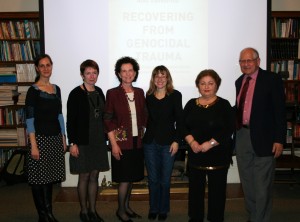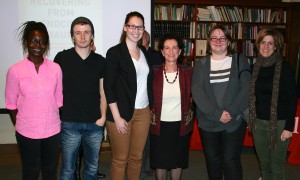Highlights from the McGill Book Launch

Presenters from left to right: Myriam Denov, PhD, James McGill Professor, School of Social Work, McGill University; Wendy Thomson, PhD, CBE, Director, School of Social Work, McGill University; Myra Giberovitch, MSW, Adjunct Professor, School of Social Work, McGill University; Shari Brotman, PhD, Director, Joint PhD Program, School of Social Work, McGill University; Chaia Libstug, BA, Holocaust survivor, winner 2012 Yaacov Zipper Award in Education; Frank Chalk, PhD, Director, Montreal Institute for Genocide and Human Rights Studies, Concordia University.
On February 19, the McGill University School of Social Work hosted the launch of my book to the academic community. I was excited to launch it at the School because it was here that I formulated my ideas and developed the foundation for my life’s work with Holocaust survivors. Faculty, current and former students, and members of my family attended the event. The McGill Bookstore was on hand to sell books and Mike Rud, Juno award nominee, provided the music.
I am grateful to the McGill staff and other individuals who helped with logistics and their contributions of time and talent – most notably: Wendy Thomson, Shari Brotman, Marilena Orsini, Kathleen Holden, Anna Stein and my son, Joel Giberovitch. I also acknowledge, Raymond Barry, my partner in life and editor, who turned my social work manual into a book accessible to a wider audience.
The co-presenters all played important roles in my career and the development of this book. I worked with Shari Brotman in the early years of my career and we have remained close friends ever since. Wendy Thomson supported my teaching at the School and encouraged me to complete this book. I refer to Myriam Denov as the godmother of my book because she encouraged me to submit it for publication to a university press after she saw me teach parts of it in her classes at McGill. Holocaust survivor, Chaia Libstug’s picture of baby carriages in the Foehrenwald displaced persons camp appears on the book cover. This picture holds special meaning because Chaia is a member of the Drop-in Centre for Holocaust Survivors at the Cummings Centre, the group to which I dedicate this book. Frank Chalk, a staunch supporter of my work, reviewed the chapter on mass atrocity crimes and directed me to pertinent literature on the subject.

Author with Students from left to right: Virginie Yeba Gbongo, Milosz Janda, Kathleen King, Myra Giberovitch, Varvara Bocharova, Kally Gikopoulos
I’ve been fortunate to find my calling in a social work career that I care deeply about. It fuels my passion and provides me with meaning and purpose. Most importantly, I am privileged to have accompanied and supported Holocaust survivors along their road towards recovery.
In my presentation, I acknowledged social work students as receivers of the recovery legacy documented in this book. “I hope each of you discovers your calling in this profession and follows your passion to make a contribution to society. And when you do, in the words of Confucius, ‘you will never work a day in your life.’ This is my wish for you.”



